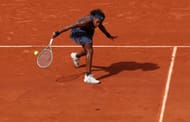French Open director Amelie Mauresmo faced criticism from a journalist during a press conference over the exclusion of women's matches from the night session. The confrontation comes days after Coco Gauff, Danielle Collins, and Ons Jabeur commented on the scheduling decision.
During a recent press conference at the French Open, the tournament director was accused of sending out a message that women are 'not worthy' of the prestigious night session matches.
"What do you think the consequences are of essentially telling women that they’re not worthy?" asked a journalist.
However, Mauresmo was not having any of it. She stopped the journalist and denied that the tournament was sending out any such message.
"That’s not what we are saying. I have to stop you right there," she said.
The journalist acknowledged that the message may not be intentional, but argued that it is being perceived that way.
"What do you think are the consequences of how the message is being received?" they asked.
Mauresmo firmly responded:
"It has never been that the girls are not worthy to play at night. It’s never been this. I will not accept that you carry this message. That’s really clear to me."
The journalist explained that their three daughters perceived the situation as a message of exclusion, adding that many women in the room felt similarly. Mauresmo, however, emphasized that the decision is based on match length. She noted that men’s best-of-five sets typically offer longer viewing experiences compared to women’s best-of-three sets.
Many WTA stars at the French Open have opened up about the scheduling, including Coco Gauff, Danielle Collins, Iga Swiatek, and Ons Jabeur.
Coco Gauff, Danielle Collins, Iga Swiatek, and Ons Jabeur's comments on the French Open night session scheduling

Since 2022, only two out of 36 night matches have featured women, with none scheduled in the past two editions of the French Open. The night session matches being played by the men have been a huge talking point in tennis this week, and many WTA stars have commented on the matter.
Coco Gauff acknowledged the scheduling dilemma, pointing out that with only one match slated for 8:15 p.m., most players, herself included, would likely prefer playing earlier. While she suggested a solution of adding a 6:30 or 7:00 p.m. match, she ultimately concluded that such decisions are up to each tournament.
"I think it’s just tournament to tournament. This tournament, this seems to me what they want. But most tournaments do have the two matches, one starting at 7:00 and one afterwards. I can’t really complain. I think it’s just up to the tournament honestly," Coco Gauff said.
Ons Jabeur was far more pointed in her criticism, expressing disappointment that women’s sports still face neglect.
"It’s still sad that we are still seeing this. I keep standing by my words. In Europe, in general, it’s unfortunate for women’s sports. Not just for tennis, but in general, whoever is making the decision.. I don’t think they have daughters. I don’t think they wanna treat their daughters like this. It’s a bit ironic, you know," Ons Jabeur said.
Jabeur also cited missed opportunities, noting matches like Paula Badosa vs. Naomi Osaka that could have drawn massive prime-time audiences.
Danielle Collins echoed this sentiment, stressing the commercial and fan value of women’s matches in primetime.
"We attract a lot of fans, a lot of crowd. We create a lot of discussion around the game overall, right? And, you know, I think there's certainly value there in having us on the night schedule as well," Danielle Collins said.
Meanwhile, Iga Swiatek maintained a neutral stance, saying her preference is daytime play and leaving the scheduling decisions to the French Open organizers.
